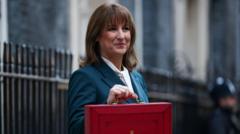Why the Budget means many will pay more tax
NeutralFinancial Markets

- The UK government has announced that tax thresholds will remain frozen for an additional three years, meaning many individuals will continue to pay taxes at the same income levels without adjustments for inflation. This decision is part of the broader budgetary measures aimed at managing public finances.
- The freezing of tax thresholds is significant as it may lead to increased tax burdens for many individuals, particularly as inflation continues to rise. This could impact disposable incomes and overall economic activity, as more people find themselves in higher tax brackets without a corresponding increase in their earnings.
- This development occurs alongside plans to increase minimum wage rates, which are expected to benefit around three and a half million low
— via World Pulse Now AI Editorial System







